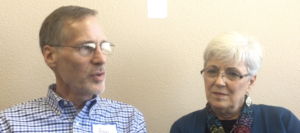by Tim Woodroof
How does a church raise up the next generation of leaders, train them to think in kingdom ways, and form them into Christ-like servants to whom the future can be entrusted?
Judging by our plans (or lack thereof), most churches seem to think the development of future leaders is largely a serendipitous process. How many churches do you know that have an intentional strategy for identifying fresh leaders, mentoring them, and grooming them to step into leadership roles when an older generation falters and fades? How many shepherds or ministers purposely take younger, full-of-potential believers under their wings to teach, encourage, and model the joys and pains of leading churches?
Certainly, God is at work in the lives of the next generation of church leaders, gifting and equipping them, calling them—like Moses—to a challenging (and sometimes unwelcome) role in his kingdom. God, in spite of our lack of initiative, will not leave his people leaderless.
And yet, surely there is a human element in raising up new leaders for God’s people. Think of Paul adopting Timothy with an eye to the future. Think of Barnabas and John Mark. Think of Aquila and Priscilla with Apollos.
The Opportunity of the Search Process
The search process is about finding your next minister, right?
That’s the short-game goal. The long-game goal is broader. The search process is also about identifying future leaders of your church, inviting them to participate in a process that is critical to the church’s health and effectiveness, and then using that process to shape, mature, and equip those future leaders for … well … the future.
This long-game goal is one of the pivotal reasons we recommend churches utilize a Search Committee. Couldn’t elders conduct the search process themselves? Certainly. But that’s not the point. Wouldn’t an elder-led search process be more efficient and timely? Probably. But, again, that’s not the point. Won’t elders, ultimately, have to make this decision anyway? Why not cut out the middle-man-committee? Again … well, you get the point.
The point is that search committees are a great tool for raising up the next generation of church leaders.
Think about what committee members experience during the search process:
- They are invited to take on a task of great importance and consequence to the church—this isn’t “make work” or counting noses.
- They are entrusted, by people they respect, with a task of great importance and consequence to the church.
- They are called to a task that makes great demands on them, requires significant sacrifice, and trusts in their best efforts and highest competencies.
- They receive a formal “charge” from their shepherds (including laying on hands and a special blessing) that explicitly highlights the spiritual nature and kingdom dimensions of their work.
- They sign a “covenant” that binds them by honor to a level of prayer, discernment, and deference that few of them have ever experienced before.
- They are asked to wrestle with theological issues like “calling” and the church’s “vision” and ministerial gifts/responsibilities and the nature of spiritual leadership at a level and to a depth that rarely happens for most church members.
- They learn how to think and talk in ways that put the Holy Spirit at the center of the process in which they are engaged … to make the Spirit a tangible partner in the search.
- They are involved in deep discussions with candidates who have dedicated their lives to serving God’s people. They run to keep up with candidates who eat, breathe, and regularly handle holy things. They are thrown into the deep end of the ministerial pool and expected to swim.
- They are asked to make decisions that affect not only their congregation but a score of ministers, minister families, and the future course of their ministries.
- They are expected to believe (and act out of confidence) that God is working through them, revealing his will to them, empowering and equipping them to be competent for the task they have been given.
Why should it surprise us, then, that the result of such an experience is the formation of leaders who will bless the church for decades to come?
It’s All in the Relationship
It is the relational nature of the search process that is primarily responsible for its formative influence on committee members. Not the process details or the documentation or the tasks to be checked off. Cultivating deeper, more intimate, and challenging relationships—something a relational search process requires and encourages—develops wiser, seasoned, and capable leaders for tomorrow’s church.
First and foremost is the richer relationship committee members forge with God, his Spirit, and his Word. When prayer and the Spirit are at the center of the search, when listening to God and discerning his will is seen as the goal of the search, when digging into Scripture and wrestling with God’s priorities and purposes has an essential place in the search, a relationship with God comes alive for committee members who, as a result, are profoundly affected and transformed. “I’ve never felt so close to God,” committee members regularly confess.
Second is the relationship committee members build with candidates. Learning about a minister’s life and family, listening to his heart and struggles, talking about ministerial victories and failings, dreaming about making a difference in a broken world: these discussions create levels of intimacy with ministers that few committee members have ever experienced. They get to walk in the shoes of ministers for a while. They get to see the world through kingdom-tinted glasses. The friendships they develop with ministry candidates change them, change their perspectives, and change their sense of life priorities. “I’ve known ministers,” search committee members will tell you, “but now I understand them. I’ve learned to think like a minister—and that’s a good thing.”
The third formative relationship committee members experience is the one they build with their church. As they interact with church members (talking about their hopes and worries for the church), as they assess the church’s health and effectiveness, as they wrestle with the church’s mission, committee members learn to love their church as Christ does … not a love of church in theory or a soft-focused, romantic love of church based mostly on a lack of information … an open-eyed, fully-informed love of church that leads as much to forgiveness and forbearance as warm and fuzzy feelings. “It was easier when I was just a member, before I saw how the sausage is made,” committee members comment. “Now that I’ve looked behind the curtain, I feel called to love my church warts and all.”
Last but not least, the relationship committee members form with each other ends up forming them. These people spend months together, meeting and praying and talking, sometimes disagreeing and arguing. Each of them is asked to share his/her story, to speak of mentors and core beliefs, to confess faith and failings, and to express hopes for the future. Over time, they learn to understand each other … and then to respect each other … and then to love each other. They learn to listen to divergent viewpoints … that you don’t always have to agree in order to honor … that trust will allow you to defer even when you see things differently. Those, of course, are critical leadership skills. “I’ve never belonged to a group of people so different but so committed to loving each other and doing what was best for the church. This committee taught me how church ought to be 24/7.”
Invite a group of people to participate in a search process and what you get is not just your next minister … you get future leaders who are equipped to take on the mantle of those who have gone before.
[All this leadership development, of course, takes place with a safety net when you collaborate with Interim Ministry Partners. Whenever the team meets, an Interim Ministry Partner (with years of experience not only in ministry but in mentoring) is present to encourage the Search Team and provide the kind of modeling and guidance budding leaders require.]



Leave a Reply